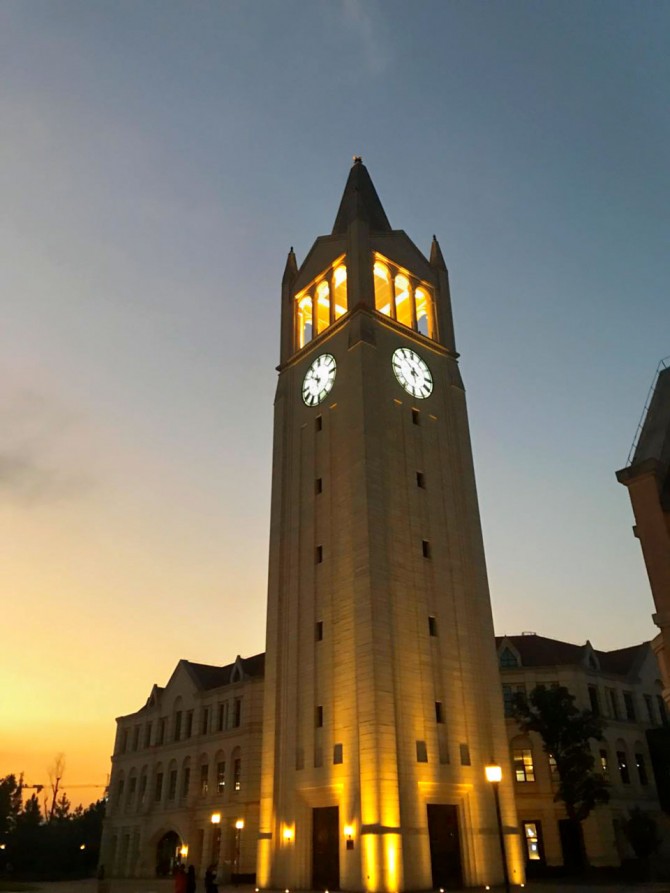
Sunset at Zhejiang University’s international campus in Haining, China.
Students find academic home in Study Away
By Priya Pradhan Sheri Englund
When Mingyang Xu ’24 visited Cornell after his junior year of high school, he fell in love with the Ithaca campus and its welcoming community.
But now, in the midst of the COVID-19 pandemic, he’s settled in more than 7,000 miles away at the international campus of Zhejiang University (ZJU) as one of 31 Cornell freshmen who are part of the Study Away program in Haining, China.
Global Cornell created Study Away last spring as a residential option for international students who faced COVID-19 visa or travel issues that prevented them from returning to Ithaca. And with the pandemic persisting, Cornell announced Nov. 17 that Study Away will be extended into the spring 2021 semester.
New and continuing applications are due on Nov. 29 at midnight; visit the Global Cornell website to learn how to apply. Study Away is open only to international students unable to return to Ithaca due to visa delays or travel restrictions.
“We’re grateful to our university partners like ZJU, who have taken such good care of our students this fall and who agreed to continue doing so this spring. And we’re so proud of our Study Away students,” said Wendy Wolford, vice provost for international affairs.
The Office of Global Learning manages placements and student support. Study Away students are based at a partner university in their home country or region, with access to the host institution’s campus facilities and housing with Cornell peers. A total of 462 international students are currently living and learning at 11 Study Away locations around the world, from China to Ghana.
“While we all would have preferred the opportunity to be together in Ithaca, providing this opportunity to international students and supporting their connection with the Cornell community in other parts of the world are critical until we can all be together again,” said Ryan Lombardi, vice president for student and campus life.
The Study Away program at ZJU is one of two specifically for first-year students; the other is Peking University in Beijing.
Study Away students at ZJU take a regular schedule of online Cornell classes with one in-person ZJU course. They fill their off hours with shared activities – from competing in basketball tournaments to performing at the university’s music festival – in a setting with relatively contained coronavirus risk.
After a peak in February, monthly cases in all of Zhejiang province are now in the single digits. Students at ZJU follow mandatory health surveillance and monitoring rules, including daily health reporting and quarantine upon arrival; masks are not currently required on campus.
This semester, Xu is heading a student organization for exchange students, including Study Away Cornellians and students in a similar program at the University of Illinois at Urbana–Champaign. He has helped to plan several events with the ZJU student community. The group will host a Thanksgiving dinner soon.
“It’s been great!” said Xu, who plans to major in biology and society. “I’ve made friends with Cornell students, and being here creates a sense of actually being at school, which I couldn’t have had at home. We’ve been able to create a really nice community here.”
One of the particular challenges of attending Cornell classes in China has been a 12- to 13-hour time difference that turns day to night. A majority of Cornell classes are offered asynchronously, but students say they try to attend class synchronously when they can in order to stay engaged.
“I found it difficult at the beginning having to adjust my sleep schedule to take classes at night,” said Phyllis Ju ’24, a freshman pursuing computer science and music. “But now I’m used to it, and I prefer attending class synchronously.”
“It doesn’t affect me as much,” said Jichu Zhang ’24, “because I’m a night person – and all the people in the dorm are night owls now, as well.”
Majoring in landscape architecture, Zhang faces the added hurdle of studio courses. He says his professor worked with him to set up weekly Zoom meetings that re-create the design presentations, critique and feedback cycles that studio courses normally offer.
Ying Hua, director of the Cornell China Center and a ZJU alumna, was able to visit the campus and its Cornellians in October. Hua toured the ZJU dorms and campus, meeting with both students and faculty. She was struck by the talent and resilience of Cornell’s freshmen class.
“There’s a strong sense of Cornell community among the students,” Hua said. “They have grown close and support each other.”
With U.S. embassies in China closed, students’ ability to get to Ithaca for the spring semester remains uncertain. “If I get a chance to go to Ithaca, I would go for sure,” Zhang said. “But if that’s not possible, I want to stay [at ZJU] in Study Away.”
Priya Pradhan ’22 is a writing intern for Global Cornell. Sheri Englund is Global Cornell’s associate director of communication.
Media Contact
Get Cornell news delivered right to your inbox.
Subscribe

